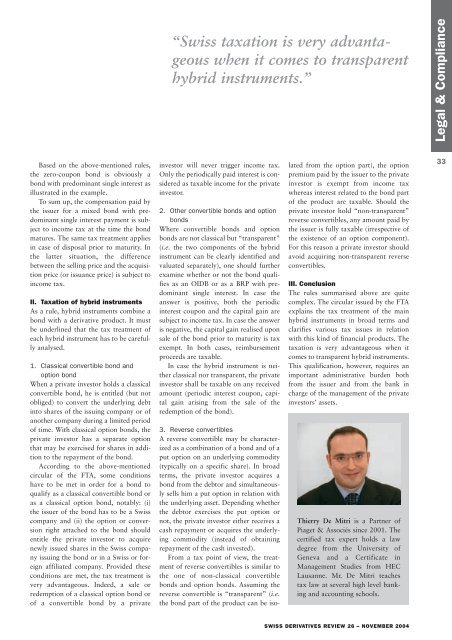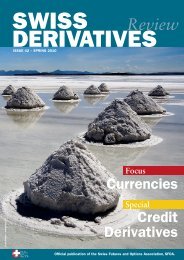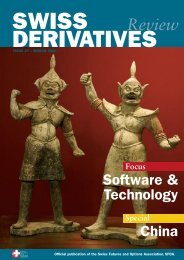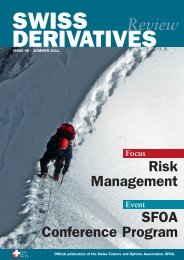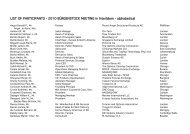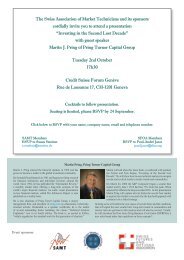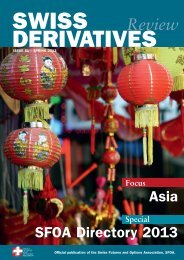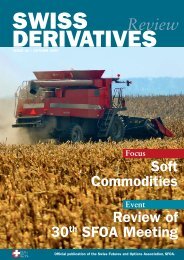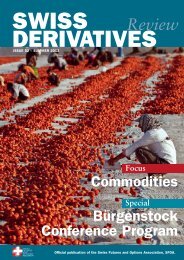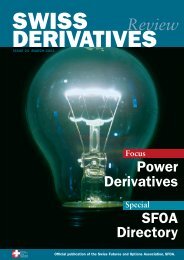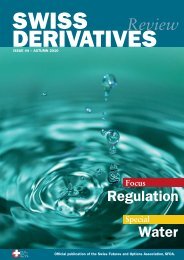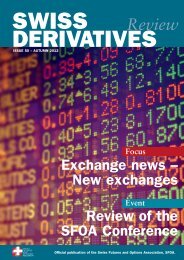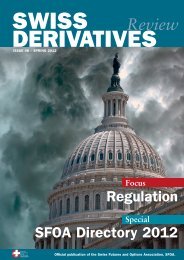Download PDF, Issue 26 - Swiss Futures and Options Association
Download PDF, Issue 26 - Swiss Futures and Options Association
Download PDF, Issue 26 - Swiss Futures and Options Association
You also want an ePaper? Increase the reach of your titles
YUMPU automatically turns print PDFs into web optimized ePapers that Google loves.
“<strong>Swiss</strong> taxation is very advantageous<br />
when it comes to transparent<br />
hybrid instruments.”<br />
Legal & Compliance<br />
Based on the above-mentioned rules,<br />
the zero-coupon bond is obviously a<br />
bond with predominant single interest as<br />
illustrated in the example.<br />
To sum up, the compensation paid by<br />
the issuer for a mixed bond with predominant<br />
single interest payment is subject<br />
to income tax at the time the bond<br />
matures. The same tax treatment applies<br />
in case of disposal prior to maturity. In<br />
the latter situation, the difference<br />
between the selling price <strong>and</strong> the acquisition<br />
price (or issuance price) is subject to<br />
income tax.<br />
II. Taxation of hybrid instruments<br />
As a rule, hybrid instruments combine a<br />
bond with a derivative product. It must<br />
be underlined that the tax treatment of<br />
each hybrid instrument has to be carefully<br />
analysed.<br />
1. Classical convertible bond <strong>and</strong><br />
option bond<br />
When a private investor holds a classical<br />
convertible bond, he is entitled (but not<br />
obliged) to convert the underlying debt<br />
into shares of the issuing company or of<br />
another company during a limited period<br />
of time. With classical option bonds, the<br />
private investor has a separate option<br />
that may be exercised for shares in addition<br />
to the repayment of the bond.<br />
According to the above-mentioned<br />
circular of the FTA, some conditions<br />
have to be met in order for a bond to<br />
qualify as a classical convertible bond or<br />
as a classical option bond, notably: (i)<br />
the issuer of the bond has to be a <strong>Swiss</strong><br />
company <strong>and</strong> (ii) the option or conversion<br />
right attached to the bond should<br />
entitle the private investor to acquire<br />
newly issued shares in the <strong>Swiss</strong> company<br />
issuing the bond or in a <strong>Swiss</strong> or foreign<br />
affiliated company. Provided these<br />
conditions are met, the tax treatment is<br />
very advantageous. Indeed, a sale or<br />
redemption of a classical option bond or<br />
of a convertible bond by a private<br />
investor will never trigger income tax.<br />
Only the periodically paid interest is considered<br />
as taxable income for the private<br />
investor.<br />
2. Other convertible bonds <strong>and</strong> option<br />
bonds<br />
Where convertible bonds <strong>and</strong> option<br />
bonds are not classical but “transparent”<br />
(i.e. the two components of the hybrid<br />
instrument can be clearly identified <strong>and</strong><br />
valuated separately), one should further<br />
examine whether or not the bond qualifies<br />
as an OIDB or as a BRP with predominant<br />
single interest. In case the<br />
answer is positive, both the periodic<br />
interest coupon <strong>and</strong> the capital gain are<br />
subject to income tax. In case the answer<br />
is negative, the capital gain realised upon<br />
sale of the bond prior to maturity is tax<br />
exempt. In both cases, reimbursement<br />
proceeds are taxable.<br />
In case the hybrid instrument is neither<br />
classical nor transparent, the private<br />
investor shall be taxable on any received<br />
amount (periodic interest coupon, capital<br />
gain arising from the sale of the<br />
redemption of the bond).<br />
3. Reverse convertibles<br />
A reverse convertible may be characterized<br />
as a combination of a bond <strong>and</strong> of a<br />
put option on an underlying commodity<br />
(typically on a specific share). In broad<br />
terms, the private investor acquires a<br />
bond from the debtor <strong>and</strong> simultaneously<br />
sells him a put option in relation with<br />
the underlying asset. Depending whether<br />
the debtor exercises the put option or<br />
not, the private investor either receives a<br />
cash repayment or acquires the underlying<br />
commodity (instead of obtaining<br />
repayment of the cash invested).<br />
From a tax point of view, the treatment<br />
of reverse convertibles is similar to<br />
the one of non-classical convertible<br />
bonds <strong>and</strong> option bonds. Assuming the<br />
reverse convertible is “transparent” (i.e.<br />
the bond part of the product can be isolated<br />
from the option part), the option<br />
premium paid by the issuer to the private<br />
investor is exempt from income tax<br />
whereas interest related to the bond part<br />
of the product are taxable. Should the<br />
private investor hold “non-transparent”<br />
reverse convertibles, any amount paid by<br />
the issuer is fully taxable (irrespective of<br />
the existence of an option component).<br />
For this reason a private investor should<br />
avoid acquiring non-transparent reverse<br />
convertibles.<br />
III. Conclusion<br />
The rules summarised above are quite<br />
complex. The circular issued by the FTA<br />
explains the tax treatment of the main<br />
hybrid instruments in broad terms <strong>and</strong><br />
clarifies various tax issues in relation<br />
with this kind of financial products. The<br />
taxation is very advantageous when it<br />
comes to transparent hybrid instruments.<br />
This qualification, however, requires an<br />
important administrative burden both<br />
from the issuer <strong>and</strong> from the bank in<br />
charge of the management of the private<br />
investors’ assets.<br />
Thierry De Mitri is a Partner of<br />
Piaget & Associés since 2001. The<br />
certified tax expert holds a law<br />
degree from the University of<br />
Geneva <strong>and</strong> a Certificate in<br />
Management Studies from HEC<br />
Lausanne. Mr. De Mitri teaches<br />
tax law at several high level banking<br />
<strong>and</strong> accounting schools.<br />
33<br />
SWISS DERIVATIVES REVIEW <strong>26</strong> – NOVEMBER 2004


